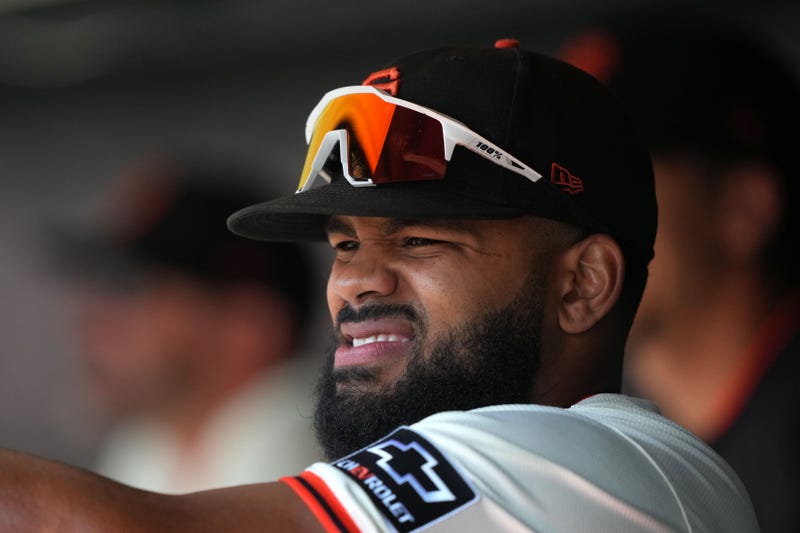Disastrous. Chaotic. Unforgivable. A train wreck. Pick any bleak adjective or metaphor, and it likely captures the San Francisco Giants’ collapse over the past few months. A brief string of wins has offered some surface-level relief, but the organization remains engulfed in the shadow of its prolonged unraveling.
Try to explain it, and you’re suddenly sunken into a deep, empty word paralysis.
That, by all accounts, is exactly what’s unfolded inside a baffled and agitated Giants clubhouse. Players and coaches alike struggle to label the collapse with anything beyond “frustrating” and “embarrassing.” The absence of answers has left little room for finger-pointing or scandal — and silence rarely makes headlines.
The daily chatter about accountability took a turn Monday afternoon when outfielder Heliot Ramos made fresh remarks in a San Francisco Chronicle piece by veteran columnist Scott Ostler.
Ostler, a longtime pillar of Bay Area sports writing, set out to gauge the players’ perspective on manager Bob Melvin, who has drawn heavy criticism from fans on social media amid the team’s recent skid. He spoke with Logan Webb, Matt Chapman and Ramos.
“I feel like he’s a great manager, at the end of the day,” Ramos told Ostler. “He’s a player’s manager, so we have nothing but love for him, we feel he’s a great manager, we just have to keep getting better and try to win games.”
Nothing out of the ordinary.
Ramos has endured uneven struggles at the plate during this skid and has been at the center of several puzzling moments — looking lost at times in left field and committing costly lapses on the bases. Through it all, Melvin has consistently come to his defense, at times going out of his way to do so.
Responding to fans who clamor for a more fiery version of Bob Melvin — the kind who flips tables or kicks dirt at umpires — Ramos doubled down on his praise for the skipper.
“Outside people don’t know anything,” Ramos said. “That’s the type of person he is. That doesn’t mean that he’s not a great manager.”

It was Ramos’ next words, though, that lit the biggest firestorm in the sports media world.
“When we were winning, everybody was on our side, now it’s like all the fans are against us and all that,” Ramos said. “I don’t get it. We’re here and we know what’s going on, we know what we’re feeling, we know what we’re working for, but fans are going to be fans, we can’t do nothing about it.”
And then, all hell broke loose.
SFGate then seized on Ramos’ remarks, ripping them from context with the headline: “SF Giants player bashes fans for being ‘against us’ after historic losing skid.” The framing painted Ramos as unlikable and ungrateful, when in truth he was merely responding to questions about the criticism surrounding Melvin.
How, critics wondered, could he accuse Giants fans of turning on the team after a homestand where loyal crowds showed up night after night, even as the club gave them nothing to cheer for across nine games?
“Outside people don’t know anything” might sound like Ramos was taking a shot at fans, but was he really? Or was he simply stating the obvious: no one understands the inner workings of the Giants clubhouse better than the players and coaches. Not even the fans — no matter how diehard they are, they aren’t insiders.
When Ramos said it feels like “all the fans are against us,” he wasn’t throwing shade at Giants supporters—he was contextualizing the gap between public perception and clubhouse reality. From his vantage point, Melvin’s leadership isn’t flashy or loud, but it’s steady and intentional. There’s a case to be made that Melvin’s tenure could be questioned. Yet while his approach may not appease the loudest voices on social media, inside the clubhouse, players understand, trust and respond to him.
Ahead of Monday's series opener against the San Diego Padres — a game in which Ramos crushed a leadoff homer in the first — the 25-year-old outfielder was forced to clarify his comments in the dugout to reporters.
"I love the fans and they always show me love in the field," Ramos said. "I have nothing against them. Every time I'm walking on the streets with my family, they love me and I love them back. All I'm trying to say is in the inner circle -- obviously not even you guys that are reporters know what's going on in the clubhouse -- all I want to say is that Bob is a great manager."
The way this story was blown out of proportion by aggregators around the Bay Area sports landscape — not just SFGate, they include original sports reporting, too — stands as a textbook example of journalism being weaponized to manufacture a flashy headline with differently spun context. It’s no wonder people are growing increasingly skeptical of the media. When coverage gets twisted like this, it leaves a sour taste with readers.
Ostler himself acknowledged that he could have provided more context for Ramos’ remarks in his column.
“If I was going to write that again, I would’ve nuanced it and taken more time to explain Heliot’s comments and give more context,” Ostler told The Morning Roast on 95.7 the Game on Tuesday. “It was much more in defense of Bob Melvin than it was any kind of attack on the fans.”
Ramos’ words were never an attack—they were a reminder that context matters, and in a world hungry for headlines, the truth often gets lost between the lines.
Writer's Note: The original version of this story unfairly called out SFGate as the only publication that resurfaced Ramos' comments, taking them — to what I believe to be — out of context. SFGate also isn't solely just aggregation, they do, in fact, write often with original reporting.

